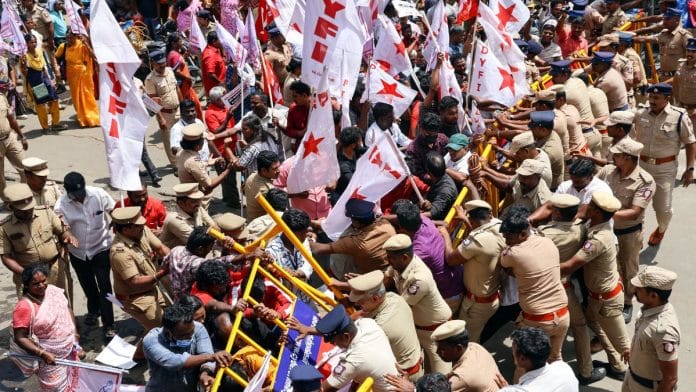New Delhi: At least 10 Central Trade Unions across India organised a 24-hour nationwide general strike on July 9, in protest against the central government’s alleged anti-labour policies. The ‘Bharat Bandh’ disrupted key services, including banking, mining, electricity and more, trade union members said.
The protest was backed by farmers, rural workers, mine workers and construction labourers demanding fair minimum wages, pensions, social security, and health insurance.
The strike especially hit places like Mumbai, Kolkata, Odisha and Bihar, where public‑sector bank branches were shuttered, their staff shouting slogans against privatisation.
In Kolkata, rail lines were blocked, with dramatic photos showing police removing barricades on roads and even extinguishing small fires lit by protesters.
In Odisha, Centre for Indian Trade Unions (CITU) members blocked highways, while in Kerala, shuttered shops and silent streets bore testimony to a near-total shutdown. Despite the strike’s scope, a few essential services including hospitals, fire departments, police, and grocery shops were functioning, and many private offices and schools stayed open.
The pictures from different protests across states showed volatile moments including scenes of bus drivers wearing helmets in Kolkata and North Bengal for safety; scuffles in West Bengal involving TMC members, and aggressive police lathi‑charges.
The trade unions have been alleging that the central government is implementing economic reforms that undermine workers’ rights. The 10 unions have been demanding that the government focus on a 17-point charter submitted last year to Labour Minister Mansukh Mandaviya, containing urgent demands ranging from scrapping labour reforms to halting privatisation.
The trade unions backing the protest include prominent organisations including the Centre for Indian Trade Unions (CITU), All India Central Council of Trade Unions (AICCTU), Indian National Trade Union Congress (INTUC), All India Trade Union Congress (AITUC), Hind Mazdoor Sabha (HMS), All India United Trade Union Centre (AIUTUC), Trade Union Coordination Centre (TUCC), Self Employed Women’s Association (SEWA), Labour Progressive Federation (LPF), and the United Trade Union Congress (UTUC).
Protesting against codes passed in 2020
The trade unions participating in the Bharat Bandh have opposed the Labour Codes passed by the government in 2020. These laws include, Code on Wages, Industrial Relations Code, Occupational Safety, Health and Working Conditions Code (OSH Code), and Code on Social Security.
As per the trade unions, these laws favour the employers and make it easier for them to hire and fire workers, restrict their right to strike by requiring prior permissions, weaken the role of trade unions, and reduce the coverage of key benefits like provident fund, gratuity, and health insurance for contract and gig workers.
“These laws will ruin the workers’ rights, including the freedom to make unions, eight-hour work shifts and protesting against employers. We want the laws to be taken back,” Amit Chakraborty, an activist working with the Centre for Struggling Trade Unions (CSTU) told ThePrint.
He added that the unions are currently demanding a minimum wage of Rs 26,000 in all sectors, stopping of privatisation of workforce immediately, and fulfilment of gig workers’ demands. “The situation is so bad that protesting while working in private sectors causes job losses immediately. People get fired, which is why many workers could not show up. Yet the response was good today,” he said.
Tapan Sen, the president of CITU told ThePrint that at least 500 districts across the country observed the strike. This included rail and road blockades, and resulted in police confrontations and arrests, he said. “95 percent coal mines were shut, 100 percent iron mines and 100 percent manganese ore mines were shut. Moreover, industries across Bangalore, Mysore and Chennai were closed. Also, the cement sector observed the strike,” he told ThePrint, adding that public sectors including banks, insurance companies across the country were completely shut. “Over 25 crore workers have gone on strike. This includes workers across different places like West Bengal, Assam, Kerala, Karnataka and more,” he said.
Similarly, Sourya Majumder, who is associated with a student-youth movement, said that unemployment is at a “historic high” in India right now. He said that the four labour codes “threaten” the future of India’s youth, promising more insecure employment in the form of contractual work in jobs of a permanent nature. “We have recently seen struggles of jobless youth across the country and the general strike called by the Central Trade Unions today is an important step for the working class to organise against this assault by the RSS-BJP regime on behalf of major multinational corporations,” he said.
(Edited by Viny Mishra)







Another communist led protest. If you are so insecure about losing jobs maybe upskill yourself instead of being lazy ?
It’s just lazy people who are afraid of privatization because everyone knows that these unskilled lazy workers would be immediately removed from their jobs.
Also that majumder who is anti MNC (big corporations). Please look at your home state Bengal. Industries don’t want to set up over there including in Kerala. Get your communism out of my state.